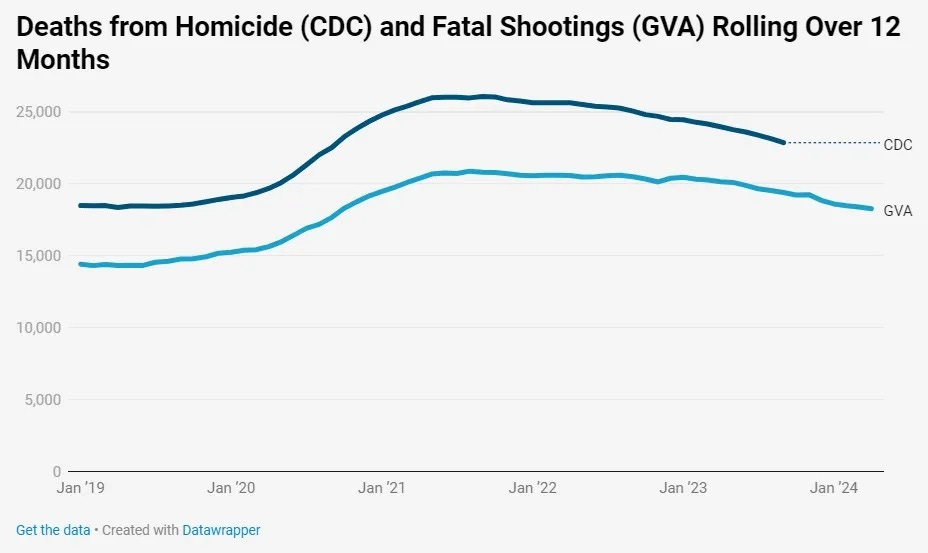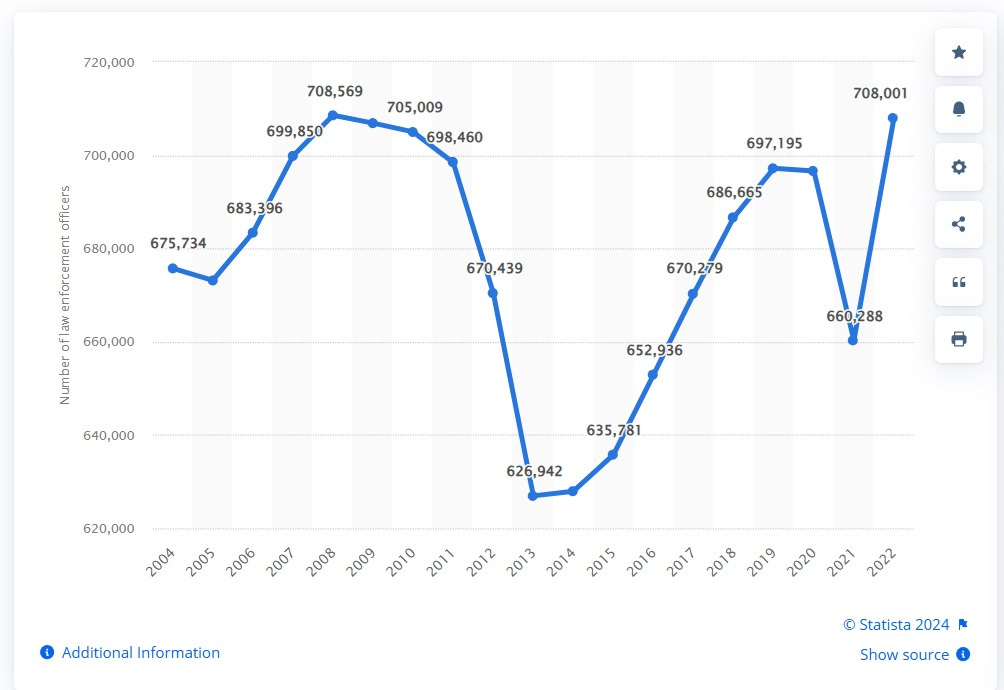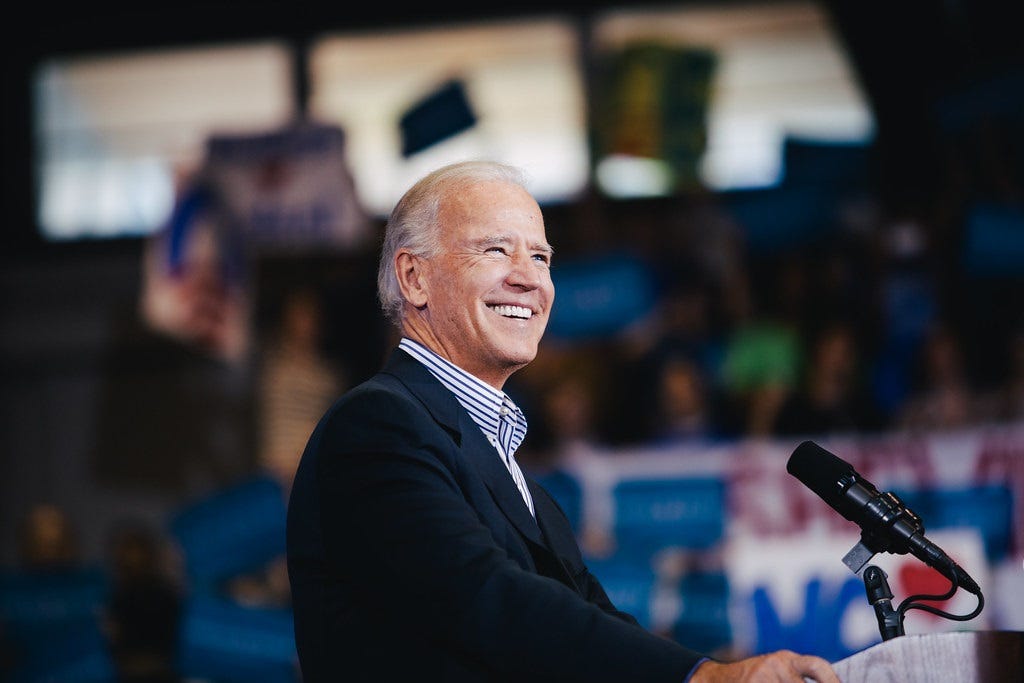Democrats fixed many of the problems of the early 2020s
It's nice to have leaders who hear what people care about and deliver results.
There’s a debate out there over whether politicians should focus on doing policies that are popular or policies that deliver tangible results to voters. These approaches sometimes go by the name of “popularism” and “deliverism”. Personally, I’ve always been skeptical of the idea that there’s a real tradeoff between the two — in general, the stuff that sounds good to people is also the stuff they end up liking, and it’s important to combine emotionally resonant rhetoric with real results.
But in any case, the Biden administration is largely thought to have embraced “deliverism”, focusing on substance over sizzle. My guess is that this was not a conscious choice, but was forced on the Dems by the fact that their President was very old and not the most articulate or rousing speaker to start with. The Biden administration was a collective enterprise out of necessity.
But that collective enterprise really delivered! During his term in office, Biden’s policies competently and effectively addressed our main short-term economic problems — first unemployment, and then inflation — while also making real progress on the long-term issue of manufacturing weakness. And Biden and local Democrats also made big progress on bringing America’s post-pandemic chaos under control — stemming the crime wave, and (very belatedly) addressing the border crisis.
Now some progressives — who were largely considered to be the advocates of “deliverism” over “popularism” in the first place — have declared the approach a failure, due to Trump’s continued popularity:
I think these progressives are failing to consider the counterfactual. If inflation or unemployment were still high, or if violent crime was still running rampant, Harris probably wouldn’t even have a chance right now. Sure, you need to do more than just quietly deliver results, but running the country into the ground will probably tank your popularity.
Still, I can’t deny being frustrated at the general lack of recognition of the real substantive accomplishments of the last four years. I recognize that most people are not wonky, policy-oriented nerds like me. That’s fine. Most people want a lot more than “line go up” from their leadership, and they deserve it. But line really did go up under Biden (or in the case of bad things like crime, line went down), and I wish other people were as happy about that as I am.
So although I understand that people care about more than this, I’d like to go through some of the substantive ways that Biden — with some help from various Democratic and moderate Republican politicians — really delivered substantive results in the early 2020s.
Biden helped fix unemployment
We’ve gotten so used to full employment in America over the past few years that we forget how dire the situation was during the pandemic. When Biden took office, there were 10 million fewer Americans with jobs than before the pandemic. By the time he leaves office, there will be 7 million more:
Some of that is population growth of course, but if you look at the percentage of prime-age Americans who have a job, you can easily see how far we’ve recovered since Biden took office:
How much of this was a natural recovery, and how much was due to Biden’s policies? We’ll never really know, because macroeconomic effects are very hard to assign to specific causes. But it’s definitely true that the U.S. economy grew much faster than the economies of other rich nations starting around 2021:

This is what powered our job market, since growth is tightly correlated with employment. And this growth has also come with falling inequality, as the working class has taken a disproportionate share of the gains.
What did the U.S. do differently from other rich countries? All had low interest rates, though the U.S. may have done more unconventional monetary policy during the pandemic. The real difference was in spending levels — America’s government borrowed and spent more than other countries, both in 2020 under Trump and in 2021 under Biden.

This is not the only reason for America’s outperformance since the pandemic, but it probably is one reason.
Biden (and Powell) fixed inflation
The fixing of unemployment definitely did come at a cost. Exactly how much of the post-pandemic inflation was due to government spending — both Trump’s CARES Act and Biden’s American Rescue Plan — is a subject of much debate. But most empirical analyses I’ve seen place the impact of demand shocks at somewhere around half of the total in 2021. Demand shocks include 1) the Fed’ monetary policy, 2) natural demand shifts from the end of the pandemic, and 3) government spending and deficits.
And in keeping with the fact that America spent more than other countries, our inflation rate was about 2 percentage points higher in 2021:

And an analysis from the San Francisco Fed in 2022 estimated that without Biden’s American Rescue Plan, inflation would have been about 3 percentage points lower. So without the ARP, we might have seen 5-6% inflation in 2021 instead of 8% inflation. Biden didn’t create inflation all on his own, but he did add to it, in order to help beat unemployment.
But also note that U.S. inflation came down much faster than inflation in the other G7 countries. By 2023, America had lower inflation than those other countries. Why?
One big reason was that the Fed raised interest rates really fast in 2022. This was Powell’s decision, but Biden reappointed Powell in late 2021, and everyone knew he was reappointing him with the job of defeating inflation. The Fed’s bold action probably had a lot to do with why inflation came down.
Another factor was that pandemic spending ended in 2022:
America spent more than other countries on pandemic relief, but this meant that spending had further to fall when the pandemic ended. Democrats don’t entirely get the credit here — Republicans would have fought to reduce pandemic spending if they had tried to keep it going. But to Dems’ credit, they acceded quickly to the need for spending reduction.1
A third reason was that Biden allowed an unprecedented amount of oil and gas drilling in the U.S. In fact, he allowed even more fracking than Trump did. And as a result, U.S. oil and gas production surged to record highs. Cheap energy really helps reduce prices for everything, since energy is an input into all production processes:

So although Biden doesn’t get all of the credit for fixing the inflation problem, he does get a lot of it.
Pro-policing Democrats fixed the crime wave
Crime in America soared during and after the summer of 2020, and continued to rise slightly in 2021. The proximate cause was the wave of protests and riots following the murder of George Floyd. Exactly why that led to a sustained rise in crime is not entirely clear, but the two leading theories — a slowdown in police effort and restrictions on police activity — both involve less policing. A lot of progressives had allowed themselves to believe that the effect of policing on crime is small or zero; the events of 2020 and 2021 provided a brutal, difficult lesson that police are actually really effective in reducing crime. Thomas Hobbes was correct, and he remains correct.
But when it comes to crime, the history of the 1970s thankfully didn’t repeat itself. The 70s saw crime stay at a very high plateau until the 1990s. But the post-pandemic crime wave in America started receding in 2022, just two years after it began:
FBI data was incomplete in 2021, and underestimated the number of murders2 in that year. But by 2022 the statistical problems were gone, so we can see that murder has fallen substantially in 2022-24:

If you just don’t trust the FBI, though, there are plenty of other independent data sources that show the exact same thing. Here’s CDC data that only goes through 2023, but which shows murders and fatal shootings starting to fall from around the middle of 2021:

Why did crime start going down so soon after Biden took office? Well, one reason is that cities — most of them heavily Democratic “blue” cities like Detroit, Milwaukee, Philadelphia, and Chicago — got very freaked out by the crime in 2020 and elected pro-police leaders in 2021. These pro-police leaders then spent a lot of money on hiring cops in 2022, bringing the number of cops in America close to the all-time high of 2008:

How much credit does the Biden administration get for this? Biden himself rejected calls to defund the police even at the height of the Floyd protests in 2020. Biden’s consistent pro-police rhetoric may have helped encourage a stronger pro-policing attitude among Democrats in the U.S., overriding progressive activists who wanted to punish law enforcement.
As President, Biden came out with the Safer America Plan, which would have hired 100,000 more police. The plan was killed in Congress (by Republicans). But Biden’s Justice Department did hand out hundreds of millions of dollars in grants to local law enforcement agencies, a lot of which was used to hire more police.
So while local politicians were by far the most important in the taming of the post-pandemic crime wave, the Biden administration probably did help.
Biden (belatedly) addressed the border crisis
The flood of asylum-seekers crossing the U.S. border has probably not harmed the country economically to an appreciable degree. But Americans are really, really mad about it. The Biden administration’s failure to address the border crisis during the first three years of his presidency stands as his starkest blunder, and the biggest blind spot of progressive governance in the modern age. Here’s data through 2023:

Just why the Biden administration dropped the ball so hard on this for three years remains a mystery. My guess is that it was some combination of:
An expectation that the asylum wave was a temporary post-pandemic phenomenon that would quickly subside,
A desire to create a moral distinction between Biden and the notoriously anti-immigrant Trump administration,
A poll-based belief that the American public was now structurally pro-immigration, and that the opinion pendulum wouldn’t swing back, and
Pressure from progressive activists.
Whatever the reason, it was a huge mistake, and public opinion swung very hard toward harsh curbs on illegal immigration. After years of ignoring the swing, the Biden administration finally acceded to the will of the people, introducing a tough bipartisan border bill (which Trump managed to kill), and taking a bunch of measures to crack down on asylum.
The crackdown worked. Border crossings plummeted like a rock:

In the long term, fixing the border will require amending U.S. asylum law to deny asylum claims to people who cross the border illegally. This will permanently remove the incentive to violate the country’s borders in search of asylum. But in the meantime, administrative measures like the ones Biden has used — which are similar to those used by Trump — seem to have mostly stemmed the tide.
Biden’s detractors will obviously never forgive him for ignoring the border issue for three years. But the fact that Biden eventually did fix the problem shows that the Democrats are, fundamentally, responsive to public opinion. I’m not sure the same can be said of Donald Trump and his MAGA movement.
Biden started to fix U.S. manufacturing weakness
I’ve written about this ad infinitum, so I won’t write too much in this section. Here’s a post where I wrote about Biden’s industrial policies in detail:
The short version here is that all of Trump’s tariffs and bluster failed to move the needle on U.S. manufacturing one iota. In fact, Trump’s term in office saw America fall even further behind China in high-tech manufacturing:

Biden kept Trump’s tariffs, but he added a crucial ingredient: industrial policy. The CHIPS Act and the Inflation Reduction Act supercharged manufacturing investment in America:

Thanks to Biden, for the first time in decades, America is now expected to claw back market share in the semiconductor industry. All my life I’ve been hearing politicians like Trump bluster about reviving U.S. manufacturing, but Biden was the first one who actually did something that worked.
Naturally, Donald Trump has declared his opposition to the CHIPS Act, putting this nascent manufacturing revival in danger.
Will Kamala Harris fix the remaining problems?
2020-21 was a very difficult, chaotic time in America — not just because of the pandemic and its aftereffects, but also because of the Floyd protests and their aftermath. When Biden took office, the country had high unemployment, accelerating inflation, and soaring violent crime. By the time he leaves office, the country will have none of those things. That’s quite an accomplishment, even if not enough people give Biden and his people the credit they deserve.
But Harris isn’t Biden, and there are still big problems to be fixed. For one, there’s the continued housing shortage. America has begun to build somewhat more housing on its own, and prices have begun to moderate, but much more needs to be done. Fortunately, it does seem like Harris recognizes how important this problem is, and plans to take action:
She has continued to talk about housing quite a lot in her stump speeches, making me optimistic that she’ll actually tackle the problem.
On the deficit, though, I worry that Harris will avoid the tax hikes and health spending cuts that are needed to put the country on a sustainable fiscal footing. Her economic plans would increase the debt by much less than Trump’s plans, but that’s not saying much. It’s been 30 years since America’s leaders had to worry about deficits, and the public isn’t up in arms yet, so I’m not confident that this one will get fixed no matter who gets into the White House.
Finally, there’s the matter of America’s anemic, atrophied defense-industrial base. The U.S. won’t be able to deter China from taking over Asia — and thus putting America’s economy in grave danger — without the ability to manufacture large numbers of missiles, ships, and drones. For all our vaunted military spending — much of which goes toward deployment expenses, health benefits, etc. — we are currently unable to actually make the weapons we need:
Harris has declared that she wants America’s military to be “the most lethal”, but I’m not sure she understands just how much the defense-industrial base will need to be improved — even in a time of fiscal austerity — for that to actually happen.
But even regarding deficits and the defense-industrial base, I have a lot more confidence in the Democrats than in Donald Trump. The Dems under Biden proved to be a highly responsive political party that actually delivers concrete solutions on big important national problems. This means that even if there are issues that Democrats are overlooking today — like deficits and defense manufacturing — it’s reasonably likely that they’ll eventually catch on and start attacking the problem. Those are the kind of leaders I’d prefer to have in charge of my nation, instead of ones focused on feuding with “the enemy within”.
Remember that it was Biden who declared the pandemic over, when some progressives believed it was still going on. Ending relief spending was part of that.
For what it’s worth, although I tend to look at murder as a measure of crime because it almost always gets reported, it’s also true that the official numbers for overall violent crime and property crime both show a steady drop, with only a small rise in 2020. If you think these crime numbers are subject to reductions in reporting, though, just go with the murder numbers like I do.











Somebody should get one of the American econ pseudo-Nobel laureates (paging Krugman?) to put in a nomination for Powell (and perhaps some of his Fed colleagues), for conclusively proving that it's possible to achieve a "soft landing". (Past laureates are automatically included in the class of people who can make nominations. See: https://www.nobelprize.org/nomination/economic-sciences/ )
LOL, what a load I am wading through here. Hip boots will not protect my clothing. I now feel dirty.
The unemployment issue was one of our making. We literally forced the closure of businesses and paid people to stay home. The vaccine and cutting payments for people to stay home brought people back to work. It took a while because people who worked in low-paying jobs did not want to return to those jobs.
Pay increased sufficiently enough to encourage service individuals to return to work. This is part of the inflation that occurred. The one Larry Summers told the Biden Administration about. We have had a wage-price spiral, and very few want to acknowledge that part of the inflation story. Nobody acknowledges that the substantial pay increases naturally had to influence the price of end products.
Our Federal government budget went up approximately 50% during Biden’s term. ARA literally turned on the printing presses, gassed up the helicopters, and flew them over America. Noah is correct in one thing. Powell is responsible for the eventual slowing of the rise of inflation.
The apologists for Democrats’ economic and lunatic spending policies talk about the slowing of inflation, never the fact that overall prices are 20% higher; however, in things that matter, like car insurance, it is well over 30%. In order to afford all this consumer spending, which fuels our economy, consumers have spent their savings and borrowed. Americans' average debt has never been higher.
After decades of low interest rates, consumers are having trouble paying down their debt. Here is note from the Fed;
"For the poorest 10% of ZIP codes, the delinquency rate increased from 14.9% in the third quarter of 2022 to 21% in the first quarter of 2024, or 41% in relative terms. The Percentage of Credit Card Debt That Is Delinquent Continues Climbing SOURCES: Federal Reserve Bank of New York/Equifax Consumer Credit Panel and authors’ calculations.”
This is why people are not buying the happy talk Noah is giving us. Yes, the Macroeconomy has great numbers, but that does not reflect life in America, where everything is so much higher. This BS that inflation has come down is a canard. The magician is showing you something over here to distract you while hiding the coin over there.
Small businesses is still having issues finding employees. Yes, immigration is helping, I think the entire crew who put on the new roof on the house were illegal immigrants. I was asked to pay cash. Still, for the small restaurant owner to find affordable, competent managerial help is not able to see that person. You still can walk into JCPenney and not see a sole working anyway except for the one cashier in the middle of the store. Certainly, no one to help you.
What Noah describes as delivering can also be called populism, as he rightly described it. I would argue it is bad for the country. Biden’s dogged determination to thwart the Supreme Court and pay off student loans was a giveaway to garner votes. It is the worst kind of government action to buy votes. Between Kamala and Trump, they are giving away America’s future and the future economic well-being of my children.
Your children will eat as much candy as you are willing to give them. The American public loves free shit from the government. Who wouldn’t, it doesn’t mean it is good for them. Shortly, the SS and Medicare shortfalls will consume us. We will either print more money and try and get others to buy our debt, or the Federal Reserve will buy our debt and it will never get paid back. Our interest rates will continue to consume our Federal spending, higher than currently being the second largest item in the Federal Budget.
You can buy what Noah is selling at your own risk, but the dark clouds on the horizon will eventually cause a storm.